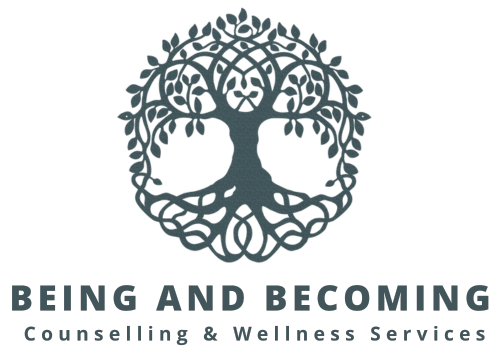BEING AND BECOMING COUNSELLING AND WELLNESS SERVICES
Intuitive Eating Counselling
Structured support to help you let go of the dieting mentality and attain a peaceful and pleasurable relationship with food.
Intuitive Eating Counselling can help you:
LET GO OF DIET CULTURE
HONOUR YOUR BODY’S NEEDS
RECLAIM PLEASURE IN EATING
You know you’ve been sold a bill of goods.
You’re tired of dieting or trying to control your eating through willpower. You have a sense it’s possible to reclaim a more peaceful and enjoyable relationship with food but you’re having trouble knowing how to get there.
You deserve to have a relationship with food and your body that is built on attunement, body-trust and respect. We can help you get there.
Intuitive Eating is an evidence-based approach that focuses on helping you meet both your biological and psychological needs by becoming attuned to your body and relearning to trust its signals. This approach focuses on moving away from rules, beliefs and thoughts that create obstacles to body attunement and body trust.
Ten Principles of Intuitive Eating
-
Reject the Diet Mentality
The research is clear — diets do NOT work. Instead of blaming yourself for “failing” another diet, release the pursuit of dieting.
-
Honour Your Hunger
Not eating frequently enough or under-nourishing yourself makes you susceptible to losing control while eating.
-
Make Peace with Food
Attempts to avoid certain foods creates feelings of deprivation which can lead to intense cravings and binge eating.
-
Challenge the Food Police
Beliefs that you are “good” or “bad for eating a certain way, interfere with your ability to listen to your body.
-
Feel Your Fullness
Learning to recognize your fullness cues allows you to make informed decisions about when your body has had enough to eat.
-
Discover the Satisfaction Factor
Reclaiming pleasure and satisfaction in your eating experiences makes it possible to determine when you have had enough.
-
Cope with Emotions with Kindness
Learning how to manage emotions effectively frees you from having to turn to food for comfort or regulation.
-
Respect Your Body
All bodies deserve respect. Treating your body with respect, no matter what it looks like, is essential to continually meeting its needs.
-
Movement — Feel the Difference
Shifting your focus to how exercise makes you feel is much more motivating than focusing on how it will change your body.
-
Gentle Nutrition
Learning to make food choices that honour your health (and taste buds) and make you feel good, supports your ability to look after your body’s health.
Benefits of Intuitive Eating
Research has shown that intuitive eating is associated with many benefits including:
Increased body appreciation
Improved life satisfaction
Increased motivation for movement
Increased intake of nutritious food
Improvements in overall health, including decreased blood pressure and cholesterol
Decreased loss of control eating and binge eating
Are you an intuitive eater?
Take this quick test to see how you rate across the different areas of intuitive eating.
Is Intuitive Eating Right For You?
-
Intuitive eating is an anti-diet approach. It is not possible to work on intuitive eating if you are still actively dieting. You cannot work on allowing your body’s signals to guide your choices if you are following externally based rues about what, when and how much to eat. This is is not to say that you can’t still feel pulled to restrict or diet, but you need to be willing to let go of dieting behaviours because they will actively get in the way of your ability to become an intuitive eater.
-
Actively pursuing weight loss will only get in your way if you are trying to work on intuitive eating. Intuitive eating can absolutely make space for processing your feelings about your body, and your wishes for your body to be different (if that is the case for you), but making choices based on a desire to lose weight is inconsistent with intuitive eating.
-
A foundational component of intuitive eating is learning to tune into, and be guided by, your body’s signals and the feedback it provides you. You need to be willing to work on reconnecting with your body and rebuilding body trust.
-
Intuitive eating is typically not an ideal approach for individuals struggling with an active eating disorder, especially during the early stages of treatment. That is not to say elements of intuitive eating cannot be incorporated into your treatment, or that you cannot graduate to working on intutive eating as you move through your recovery journey. This is especially possible when working with a clinician who is trained in both intuitive eating and eating disorders.
-
Intuitive eating is not a quick fix. Becoming an intuitive eater is a process and requires a commitment on your part to put in the work to transform your relationship with food. It often requires a lot of unlearning and re-learning.
-
Typically any unresolved trauma needs to be addressed before you begin working on intuitive eating. Trauma dysreguates the nervous system, which impairs your ability to tune into what is happening inside your body in a useful and regulated way, which impairs your ability to be guided by internal cues.
Clinicians Offering Intuitive Eating Counselling
-
Alexandra Haggis
Registered Dietitian
-

Dr. Margaret Brennan
Registered Psychologist




